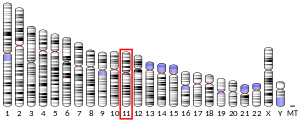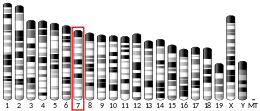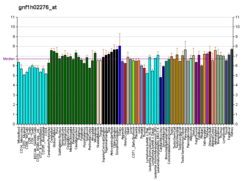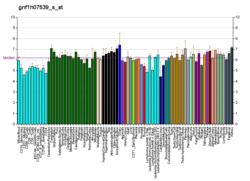MAP6
Microtubule-associated protein 6 (MAP6) or stable tubule-only polypeptide (STOP or STOP protein) is a protein that in humans is encoded by the MAP6 gene.[5][6]
This gene encodes a microtubule-associated protein (MAP). The encoded protein is a calmodulin-binding and calmodulin-regulated protein that is involved in microtubule stabilization. Two transcript variants encoding distinct isoforms have been identified for this gene.[6]
References
- 1 2 3 GRCh38: Ensembl release 89: ENSG00000171533 - Ensembl, May 2017
- 1 2 3 GRCm38: Ensembl release 89: ENSMUSG00000055407 - Ensembl, May 2017
- ↑ "Human PubMed Reference:".
- ↑ "Mouse PubMed Reference:".
- ↑ Andrieux A, Salin PA, Vernet M, Kujala P, Baratier J, Gory-Faure S, Bosc C, Pointu H, Proietto D, Schweitzer A, Denarier E, Klumperman J, Job D (Sep 2002). "The suppression of brain cold-stable microtubules in mice induces synaptic defects associated with neuroleptic-sensitive behavioral disorders". Genes Dev. 16 (18): 2350–64. doi:10.1101/gad.223302. PMC 187434. PMID 12231625.
- 1 2 "Entrez Gene: MAP6 microtubule-associated protein 6".
Further reading
- Bosc C, Cronk JD, Pirollet F, et al. (1996). "Cloning, expression, and properties of the microtubule-stabilizing protein STOP". Proc. Natl. Acad. Sci. U.S.A. 93 (5): 2125–30. doi:10.1073/pnas.93.5.2125. PMC 39921. PMID 8700896.
- Denarier E, Aguezzoul M, Jolly C, et al. (1998). "Genomic structure and chromosomal mapping of the mouse STOP gene (Mtap6)". Biochem. Biophys. Res. Commun. 243 (3): 791–6. doi:10.1006/bbrc.1998.8179. PMID 9501006.
- Zapata JM, Pawlowski K, Haas E, et al. (2001). "A diverse family of proteins containing tumor necrosis factor receptor-associated factor domains". J. Biol. Chem. 276 (26): 24242–52. doi:10.1074/jbc.M100354200. PMID 11279055.
- Nagase T, Nakayama M, Nakajima D, et al. (2001). "Prediction of the coding sequences of unidentified human genes. XX. The complete sequences of 100 new cDNA clones from brain which code for large proteins in vitro". DNA Res. 8 (2): 85–95. doi:10.1093/dnares/8.2.85. PMID 11347906.
- Strausberg RL, Feingold EA, Grouse LH, et al. (2003). "Generation and initial analysis of more than 15,000 full-length human and mouse cDNA sequences". Proc. Natl. Acad. Sci. U.S.A. 99 (26): 16899–903. doi:10.1073/pnas.242603899. PMC 139241. PMID 12477932.
- Bosc C, Andrieux A, Job D (2003). "STOP proteins". Biochemistry. 42 (42): 12125–32. doi:10.1021/bi0352163. PMID 14567673.
- Letournel F, Bocquet A, Dubas F, et al. (2004). "Stable tubule only polypeptides (STOP) proteins co-aggregate with spheroid neurofilaments in amyotrophic lateral sclerosis". J. Neuropathol. Exp. Neurol. 62 (12): 1211–9. PMID 14692697.
- Ota T, Suzuki Y, Nishikawa T, et al. (2004). "Complete sequencing and characterization of 21,243 full-length human cDNAs". Nat. Genet. 36 (1): 40–5. doi:10.1038/ng1285. PMID 14702039.
This article is issued from
Wikipedia.
The text is licensed under Creative Commons - Attribution - Sharealike.
Additional terms may apply for the media files.






